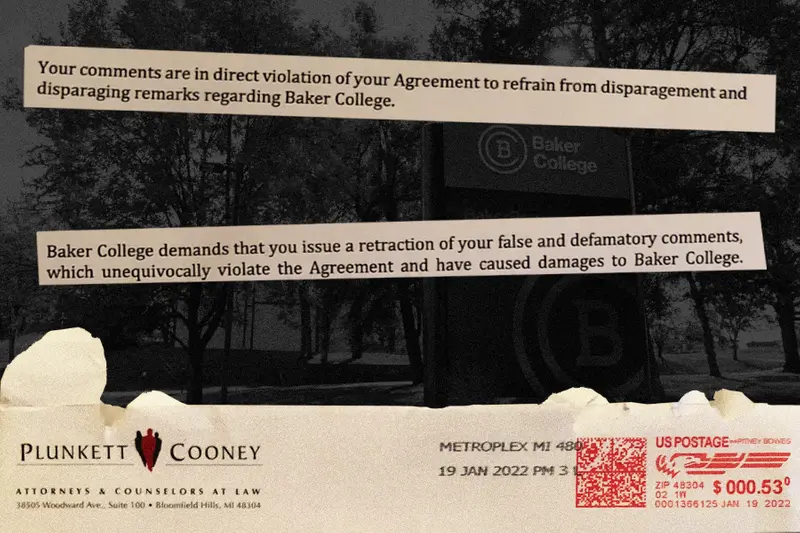Baker College, one of the largest private schools in Michigan, is threatening legal action against a former faculty member who spoke to ProPublica and the Detroit Free Press for an investigation published this month.
Jacqueline Tessmer, who taught digital media for 14 years at Baker’s campus in Auburn Hills, told the news organizations that students often came to the nonprofit college unprepared to succeed and exited without degrees or good jobs but with heavy debt from loans. “Baker College has ruined a lot of people’s lives,” she said in the story.
A Jan. 19 letter to Tessmer — sent by the law firm Plunkett Cooney on behalf of Baker — demanded she retract her statements, which it described as “false and defamatory.” It did not specify what, if anything, was false. Arguing that Tessmer was in violation of a nondisparagement clause in a settlement she reached with Baker in an employment dispute, attorney Courtney L. Nichols also demanded that she “agree voluntarily to remit payment to Baker College for the damages it has suffered as a result of your violation(s), including attorney fees.” The letter did not include a dollar amount.
Since publication, Baker has not contacted either news organization to contest the validity of her statements. Before publication, the Free Press and ProPublica informed Baker that Tessmer would be quoted and shared her comments. Baker did not specifically address those quotes or Tessmer’s time at the college.
Baker’s letter to her after publication gave her seven days to respond. Tessmer said in an interview this week she stands by her comments and will not meet the college’s demands.
She said she didn’t see how it would be possible to make a retraction even if she wanted to, given that she expressed her opinion “based on what I did in service to the college” and her comments were only “a couple of sentences in a giant article.”
“I could be quiet, but is it really going to matter at this point?” she added.
The story on Baker examined the college’s low graduation rates, its aggressive marketing and the oversight of a Board of Trustees that has included former presidents of the school.
In addition to the letter to Tessmer, Baker responded to the article by emailing students, writing a letter to the editor in the Free Press, and placing a statement on its website that disparaged the story and touted the school’s achievements. Officials have defended the 111-year-old college as an affordable open enrollment school whose practices are reviewed by regulators and accreditors.
Neither Baker nor its lawyer has responded to a request for comment on the legal threat.
Tessmer’s relationship with Baker ended in a lawsuit she filed for breach of contract and retaliation. The school disputed her claims in a countersuit, and the case ended in a settlement in 2014. The letter from Baker’s lawyer also suggested that if Tessmer had spoken about the settlement, she would be in violation of it.
“This is what they do,” said Tessmer, now self-employed. “They scare. They huff and they puff, and it works a lot of the time. I mean, it’s worked on me.”
The letter to Tessmer said that if she did not comply, “Baker College will consider its available recourse.”
As of Thursday evening, Tessmer had not heard again from the law firm.











